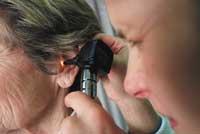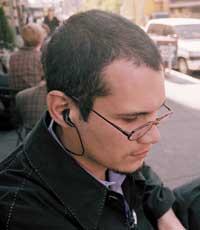How to combat deafness
The ear, a sense that we should take care more

The ear is very useful and helpful while well. But we often do not realize to what extent certain factors or conditions we know well can attack and damage that sense, to the point of losing it totally (or almost totally).
At the moment, it is inevitable that over the years he will lose hearing and become "deaf" or "audible". But we should do what is in our hands to keep our ears to the full. If not, after a more or less long process, we will be immersed in isolation and solitude.
More surprises in cities
In most cases, deafness is not something that appears from night to morning, but a process that is slowly suffering. "The reasons are multiple and varied," says expert José Salinero, but "the possibilities of auditory aggression are greater in industrialized societies, even in urban areas, driven by the peculiarities of these environments." In this sense, various studies carried out today have shown that people with hearing problems are much more in cities than in rural areas, for various reasons, as we will see.
Although with age it is necessary to control more surveillance of the auditory organs, attention to the sick ear should be at any age.
During pregnancy
Apart from the errors and hearing impairments that accompany malformation syndromes, certain infections should be avoided during pregnancy (rubella, syphilis, herpes or toxoplasmosis, for example, major), as well as the consumption of toxins by the mother, drugs, alcohol or other toxic drugs. For all these reasons the child can suffer deafness. As we have seen, we must begin to take care of this important part of our body before birth.
In childhood
At this time, the hearing deficit is due to infectious and inflammatory processes. This means that the risk of injury to middle ear structures (eardrum or bones) by children who repeatedly suffer upper respiratory and hearing infections increases considerably. Therefore, if the child purges through the ears (detaches pus), it is best to take it to the doctor for the specialist to control the situation. On the other hand, it is convenient that the child's defenses are at a normal level, in which the proper feeding is important.
Adolescence Adolescence

In this stage of life, the factors that can cause hearing to be defective are usually very different: it is usually traumatisms, both fixed and sound. These traumatisms can be due to a heavy blow of ear (for example, accident or sport) and exposure to excessively noisy environments (such as discos, bars or pubs, as well as an excess volume of the headphones of walkie-talkies). "In these cases the deafness would be of inner ear and corresponds mainly to sharp sounds", explains the expert José Salinero.
Maturity of maturity
Here too, it is important to avoid excessive noises like the workplace. So, if for your job you need to use noisy machinery or the work environment is like this, you should use helmets to protect your ears. Other factors to take into account are:
- Foods rich in cholesterol. Hyperlipidemia damages the inner ear. This is what Salinero explains: "The vascularization of the inner ear is very poor. If an artery is clogged anywhere else in the body, the blood may reach that part of the body by another complementary way. But this does not occur in the ear, and if the hearing artery is clogged, the ear would run out of blood supply."
- Tobacco. For the same reason, tobacco, high blood pressure, immunological explanations and even allergy related can cause a loss of hearing. All these causes generate pathologies that affect the blood vessels.
In old age
The most affected is the inner ear. This type of deafness is called presbytery and can be aggravated by diabetes or high stress. In addition to not listening properly, patients experience subjective noises (tinnitus).
Non-total hearing loss can be repaired or improved with a hearing aid. But if the loss is total, surgery should be used to implant a cochlear implant that replaces the inner ear and excite the nerve endings of the auditory nerve.
To take care of your earsHere are a few simple tips or recommendations to avoid possible ear problems.
|





